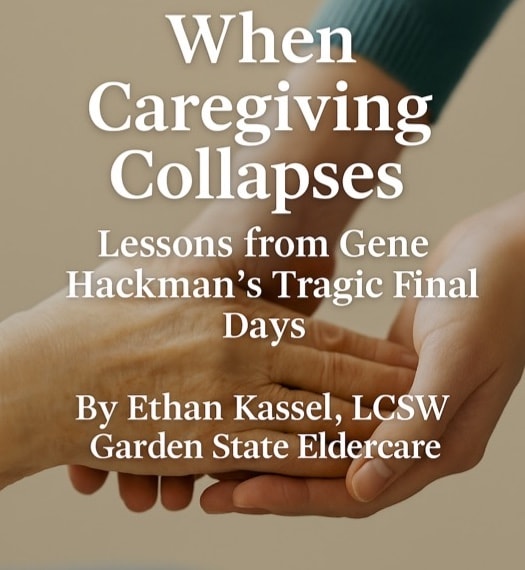By Ethan Kassel, LCSW – Garden State Eldercare
Published: April 5, 2025
The heartbreaking deaths of actor Gene Hackman, 95, and his wife Betsy Arakawa, 65, sent shockwaves through the caregiving and eldercare communities. While best known for his legendary Hollywood career, Hackman spent his final years battling Alzheimer’s disease, under the primary care of Arakawa.
On February 26, 2025, both were found deceased in their Santa Fe home. Arakawa had succumbed to hantavirus pulmonary syndrome, a rare and fatal illness linked to rodent exposure. With her sudden death, Hackman—without his caregiver or support system—passed away shortly after from heart disease, with Alzheimer’s as a contributing factor.
As a licensed clinical social worker and co-founder of Garden State Eldercare, I was deeply affected by this tragedy. It inspired this, my first blog, to reflect on what could have been done differently from a geriatric care management and home care perspective.
1. Create a Comprehensive Care PlAN
Every care situation should have a structured, written plan in place—not just for the client, but also for the caregiver. This includes identifying backup care providers (professional or family), outlining routines, managing medications, and assigning responsibilities. In emergencies, a comprehensive plan ensures no one is left without support.
2. Monitor Health for Both Client and Caregiver
Caregivers often put their own health last. But in cases like Arakawa’s, early detection of symptoms might have prompted timely intervention. Routine wellness checks for both the elderly individual and the caregiver can prevent avoidable medical crises.
3. Provide Support and Respite for Caregivers
Caregiving is demanding. Without adequate respite, even the most devoted caregivers face burnout or health decline. Families and professionals must prioritize scheduled relief, caregiver training, and access to emotional support resources. As Emma Heming Willis—wife of Bruce Willis—recently said, “Caregivers need care too.”
4. Build a Broader Support Network
Care should never fall on one person alone. A well-rounded support network—including family, friends, neighbors, and home care professionals—can provide day-to-day assistance, monitor changes, and intervene when needed.
5. Be Prepared for Emergencies
Tragedy often strikes without warning. Every household with a high-need elder should have an emergency action plan:
- A list of contacts
- Medical and legal documentation
- Emergency medical instructions
- A designated secondary caregiver
This level of preparation can make all the difference when unexpected circumstances arise.
Final Thoughts
This tragedy highlights a harsh truth: when caregiving systems fail, the consequences can be devastating. But it also gives us an opportunity to learn—and to act.
At Garden State Eldercare, our mission is to help families create sustainable, safe, and supportive care environments. Whether you’re planning for a loved one’s future or navigating care today, I encourage you to revisit your current plans, ask the tough questions, and ensure no one—caregiver or client—is left vulnerable.
Thank you for reading.
– Ethan Kassel, LCSW
Co-Founder, Garden State Eldercare
Further reading:

